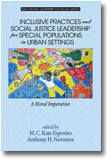
Inclusive Practices and Social Justice Leadership for Special Populations in Urban Settings
A Moral Imperative
Edited by:
M.C. Kate Esposito, California State University Dominguez Hills
Anthony H. Normore, California State University Dominguez Hills
A volume in the series: Educational Leadership for Social Justice. Editor(s): Jeffrey S. Brooks, Curtin University. Denise E. Armstrong, Brock University. Ira Bogotch, Florida Atlantic University. Sandra Harris, Lamar University. Whitney Sherman Newcomb, Virginia Commonwealth University. George Theoharis, Syracuse University.
Published 2015
Inclusive Practices and Social Justice Leadership for Special Populations in Urban Settings: A Moral Imperative is comprised of a collection of chapters written by educators who refuse to let the voices of dissent remain marginalized in our discussion of education in the 21st century education. Drawing from the authors’ extensive experience in educational research and practice, coupled with their commitment to inclusion of special populations and social justice they urge readers to examine how educational policies are produced for the least advantaged in our schools. Effective inclusionary practices most certainly benefit all students, including English language learners, those who face gender discrimination, those who are in the foster care system, and those who are Gay, Lesbian, Bisexual, or Transgendered.
This collection presents a broader theoretical inclusive framework rooted in social justice: which we assert, offers the best practices for a greater number of students who are at risk of minimal academic success. This broader conceptualization of inclusive schools adds to extant discourses about students with exceptional needs and provides effective strategies school leaders operating from a social justice framework can implement to create more inclusive school environments for all students, especially those in urban centers. It is hoped that lessons learned will improve the preparation and practice of school leaders, thus improve educational outcomes for students from special populations.
CONTENTS
Series Editor’s Preface, Jeffrey S. Brooks. Foreword, Peter McLaren. Introduction and Overall Framework. Why Equity Matters in “Turn White and Speak English” Political Climate: English Language Learners and Educational Trajectories, Irina S. Okhremtchouk. Deaf Culture and Education: Toward a Culturally Relevant Leadership, Catherine O’Brien and Jeffrey S. Brooks. Creating Inclusive Schools for Gay, Bisexual, Lesbian, Transgender, and Queer/Questioning (GBLTQ) Students: Applying a Social Justice Framework, James Thing and M. C. Kate Esposito. Intersections of Autism, Race, and Class: A Social Justice Agenda for Inclusive Leadership Practices, Melissa Spence and Edlyn Vallejo Peña. Inclusion Needs of Youth in the Foster Care System Through Strategic Mentoring: A Social Justice Perspective, Susanne M. Foulk. Affect and Resilience in Urban Females: An Emerging Paradigm, Theresa Garfield Dorel and Armando Tejeda. Educating the Incarcerated Through a Community Jailing Model: A Social Justice Leadership Perspective, Brantley R. Choate Sr. and Anthony H. Normore. A Culturally Responsive Framework for Social Justice, Mere Berryman, Ann Nevin, Suzanne SooHoo, and Therese Ford. Our Forgotten Sons: The Underachievement of Boys of Color in America’s Urban Centers, Nicole Limperopulos. Chemically Dependent Adolescent Latino Offenders: Restorative and Social Justice as Alternatives to Incarceration, Paul M. Marietti, Janice Tucker, and Anthony H. Normore. Implementing a Holistic Approach to Enhance Career Opportunities for Transition Students With Disabilities, Susan Stuntzner and Bryan Austin. About the Contributors.
-
Paperback978-1-68123-107-5
Web price: $45.04 (Reg. 52.99)
-
Hardcover978-1-68123-108-2
Web price: $80.74 (Reg. 94.99)
- eBook978-1-68123-109-9

-
 Adult Intentions, Student Perceptions
How Restorative Justice is Used in Schools to Control and to Engage
Adult Intentions, Student Perceptions
How Restorative Justice is Used in Schools to Control and to Engage
-
 Crossing the Bridge of the Digital Divide
A Walk with Global Leaders
Crossing the Bridge of the Digital Divide
A Walk with Global Leaders
-
 Dear Gay, Lesbian, Bisexual, And Transgender Teacher
Letters Of Advice To Help You Find Your Way
Dear Gay, Lesbian, Bisexual, And Transgender Teacher
Letters Of Advice To Help You Find Your Way
-
 Envisioning a Critical Race Praxis in K-12 Education Through Counter-Storytelling
Envisioning a Critical Race Praxis in K-12 Education Through Counter-Storytelling
-
 Restorative Practice Meets Social Justice
Un-Silencing the Voices of "At-Promise" Student Populations
Restorative Practice Meets Social Justice
Un-Silencing the Voices of "At-Promise" Student Populations
-
 School Leadership in a Diverse Society
Helping Schools Prepare all Students for Success (2nd Edition)
School Leadership in a Diverse Society
Helping Schools Prepare all Students for Success (2nd Edition)
-
 Within Reach
Providing Universal Access to the Four Pillars of Literacy
Within Reach
Providing Universal Access to the Four Pillars of Literacy

